If you’re starting an LLC, the business entity formation process is one of the first and most important hurdles. This step can be terribly complex ...
Arizona, Ohio, Missouri and New Mexico don’t require an LLC annual report or fee.
We earn commissions if you shop through the links below. Read more
Written by: Carolyn Young
Carolyn Young is a business writer who focuses on entrepreneurial concepts and the business formation. She has over 25 years of experience in business roles, and has authored several entrepreneurship textbooks.
Edited by: David Lepeska
David has been writing and learning about business, finance and globalization for a quarter-century, starting with a small New York consulting firm in the 1990s.
Published on January 5, 2022

An annual report, sometimes known as a statement of information, for a limited liability company (LLC) needs to be filed with your state to keep your LLC in good standing.
Most states require an annual LLC report, which simply verifies your business information and that you’re still doing business.
Every state’s form and requirements are different but most annual reports will require:
If any of this information has changed since you originally formed your LLC, you should update it in your annual report. Your state may also require an amendment to change your LLC information.
Filing an annual report is usually relatively simple, but not in all cases. This handy guide walks you through the process to ensure an easy filing and the continued smooth operation of your business.
A-M
M-W
Every state has its own reporting requirements. Some states require an annual report, others a biennial report. In most states, a fee is involved. Reports are generally filed with the Secretary of State, so you should be able to find the information on their website.
Arizona, Ohio, Missouri and New Mexico don’t require an LLC annual report or fee.
Below, you’ll discover guides on how to file an annual report for all 50 states. This includes direct links to the relevant state agencies responsible for the submission and processing of annual reports, along with a breakdown of the filing fees required in each state.
In Alabama, the annual report and business privilege tax return is filed with the Department of Revenue. You can file online by visiting the revenue department’s website and taking the following steps.
If you choose to file by mail, you can download the forms and mail them, along with the $10 fee and your business privilege tax, to:
Alabama Department of Revenue
Business Privilege Tax Section
P.O. Box 327320
Montgomery, AL 36132-7320
Phone (334) 242-1820
In Alabama, annual reports are due on the 15th day of the 3rd month after the beginning of the taxable year. The penalty for late filing is $50, and interest will continue to accrue if you don’t file.
In Alaska, the biennial report is filed with the Division of Corporations. You can file online by visiting the corporation division’s website and taking the following steps.
If you choose to file by mail, you can print a paper copy of the biennial report form and mail it, along with the $100 fee, to:
Corporations Division
550 W 7th AVE, STE 1500
Anchorage, AK 99501-3567
Phone: (907) 269-8160
Fax: (907) 269-8156
In Alaska, biennial reports are due every two years on January 2. The penalty for filing late is $37.50, while the penalty for failing to register a report altogether is the dissolution of the LLC.
In Arkansas, the annual franchise tax report is filed with the Secretary of State. You can file online by visiting the secretary of state’s website and taking the following steps.
If you choose to file by mail, you can download the form and mail it, along with the $150 filing fee, to:
Business and Commercial Services
P.O. Box 8014
Little Rock, Arkansas 72203
Phone: 501-682-3409
In Arkansas, annual franchise tax reports are due every year by May 1st. The penalty for filing late is $25 plus interest, while the penalty for failing to register a report altogether is the dissolution of your LLC.
In California, the statement of information is filed with the Secretary of State. You can file online by visiting the secretary of state’s website and taking the following steps.
If you choose to file by mail, you can download the form and mail it, along with the $20 filing fee, to:
Secretary of State Business Programs Division
Business Entities
1500 11th Street
Sacramento, CA 95814 or
P.O. Box 944260, Sacramento, CA 94244-260
Phone (916) 657–5448
In California, statements of information are due every two years within 90 days of the date you started your business. The penalty for filing late is $250, while the penalty for failing to register a report altogether is suspension of the LLC.
In Colorado, the periodic report is filed with the Secretary of State. You can file online by visiting the secretary of state’s website and taking the following steps.
You cannot file your periodic report by mail. You can only file online.
If you need any assistance you can contact the secretary of state’s office at:
303-894-2200
303-869-4864 (FAX)
In Colorado, periodic reports are due every year on the date you started your business. The penalty for filing late is $50, while the penalty for failing to register a report altogether is the dissolution of the LLC.
In Connecticut, the annual report is filed with the business division. You can file online by visiting the business division’s website and taking the following steps.
Colorado annual reports cannot be filed by mail. They must be filed online. If you need any assistance, you can contact the business division at:
State of Connecticut
165 Capitol Avenue
Hartford, CT 06106
Email: [email protected]
Telephone: (860) 509-6200
In Connecticut, annual reports are due every year by March 31st. The penalty for filing late is $0, while the penalty for failing to register a report altogether is the dissolution of the LLC.
In Delaware, the annual tax is paid through the Division of Corporations. You can file and pay online by visiting the corporations division’s website and taking the following steps.
In Delaware, annual taxes are due every year by June 1st. The penalty for filing late is $200, while the penalty for failing to register a report altogether is additional interest on the tax and the penalty, and eventual dissolution of the LLC.
If you need assistance, you can contact the Division of Corporations at (302) 739-3073.
In Florida, the annual report is filed with the Division of Corporations. You can file online by visiting the corporation division’s website and taking the following steps.
You cannot file your annual report by mail. You can only file online. If you need assistance, you can contact the corporations division at 850.245.6000.
In Florida, annual reports are due every year by May 1st. The penalty for filing late is $400, while the penalty for failing to register a report altogether is the administrative dissolution of the LLC.
In Georgia, the annual registration is filed with the Secretary of State. You can file online by visiting the secretary of state’s website and taking the following steps.
To file by mail, do the following:
Georgia Corporations Division
2 MLK Jr. Dr.
Suite 313, Floyd West Tower
Atlanta, GA 30334
Phone: (404) 656-2817
In Georgia, annual reports are due every year on April 1st. The penalty for filing late is $25, while the penalty for failing to register a report altogether is a civil suit or administrative dissolution of the LLC.
In Hawaii, the annual report is filed with the Department of Commerce and Consumer Affairs. You can file online by visiting the Hawaii business express website and taking the following steps.
If you choose to file by mail, you can download the form and mail it, along with the $15 fee, to:
Annual Filing – BREG
P.O. Box 40
Honolulu, HI 96810
Phone: (808) 586-2727
In Hawaii, the annual report due date is dependent on the registration date. If the date of registration falls between:
The penalty for filing late is $100 per month of delinquency, while the penalty for failing to register a report altogether is the administrative termination of the LLC.
In Idaho, the annual report is filed with the Secretary of State. You can file online by visiting the SOSbiz website and taking the following steps.
You cannot file your annual report by mail. You can only file online.
In Idaho, annual reports are due every year by the end of the anniversary month of your LLC registration. The penalty for filing late is $0, but the penalty for failing to register a report altogether is the dissolution of your LLC.
If you need assistance, contact the Idaho Secretary of State’s office at:
(208) 334-2301
[email protected]
In Illinois, the annual report is filed with the Secretary of State. You can file online by visiting the secretary of state’s website and taking the following steps.
If you choose to file by mail, you can download the form and mail it, along with the $75 filing fee, to:
Secretary of State
Department of Business Services
Limited Liability Division
501 S. Second St., Rm. 351
Springfield, IL 62756
Phone: 217-524-8008
In Illinois, annual reports are due every year by the end of the month prior to the anniversary month of the LLC registration. The penalty for filing late is $100, while the penalty for failing to register a report altogether is the dissolution of the LLC.
In Indiana, the business entity report is filed with the Department of Revenue. You can file online by visiting the INbiz website and taking the following steps.
If you choose to file by mail, you can download the form and mail it, along with the $50 fee, to:
Secretary of State
Business Services Division
302 West Washington St. Room E018
Indianapolis, IN 46204
Phone: (317) 232-6576
In Indiana, business entity reports are due every other year at the end of the anniversary month of the LLC registration. The penalty for filing late is $0, while the penalty for failing to register a report altogether is the dissolution of the LLC.
In Iowa, the biennial report is filed with the Secretary of State. You can file online by visiting the Iowa fast track filling website and taking the following steps.
If you choose to file by mail, there is no specific form to fill out. You’ll need to create your own report that includes:
You’ll mail your report, along with the $45 fee, to:
Business Services
First Floor, Lucas Building
321 E. 12th St.
Des Moines, IA 50319
Phone: 515-281-5204
In Iowa, biennial reports are due every other year by April 1st. The penalty for filing late is $0, but the penalty for failing to register a report altogether is the dissolution of the LLC.
In Kansas, the annual report is filed with the Secretary of State. You can file online by visiting the secretary of state’s website and taking the following steps.
If you choose to file by mail, you can download the form and mail it, along with the $55 fee, to:
Memorial Hall, 1st Floor
120 S.W. 10th Avenue
Topeka, KS 66612-1594
(785) 296-4564
In Kansas, annual reports are due every year by April 15th. The penalty for filing late is $0, while the penalty for failing to register a report for 90 days or more is forfeiture of the LLC.
In Kentucky, the annual report is filed with the Secretary of State. You can file online by visiting the secretary of state’s website and taking the following steps.
You can print the form from the same site and file by mail if you choose. You can mail it, along with the $15 filing fee, to:
Office of the Secretary of State
Filings Branch
700 Capital Ave.
P.O. Box 718
Frankfort, KY 40602
Phone: (502) 564-3490
Fax: (502) 564-5687
In Kentucky, annual reports are due every year by June 30th. If you do not file your annual report by June 30th your LLC will be immediately dissolved and you will have to apply for reinstatement.
In Louisiana, the annual report is filed with the Secretary of State. You can file online by visiting the geauxBIZ website and taking the following steps.
If you choose to file by mail, you can print the form from the same website and mail it, along with only a $30 fee, to:
Louisiana Secretary of State
P.O. Box 94125
Baton Rouge, LA 70804-912
225.922.2880
225.922.2003 fax
In Louisiana, annual reports are due every year on the date you started your business. The penalty for filing late is $0, but the penalty for failing to register a report altogether is dissolution of the LLC.
In Maine, the annual report is filed with the Secretary of State. You can file online by visiting the Annual Reports Online page and taking the following steps.
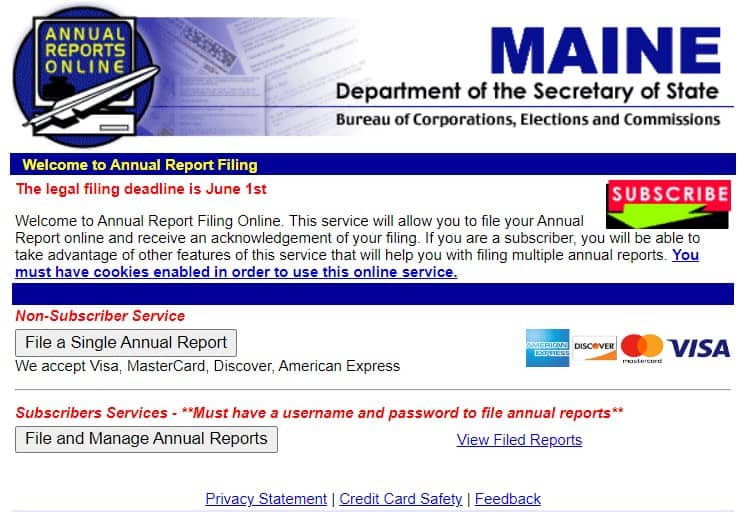
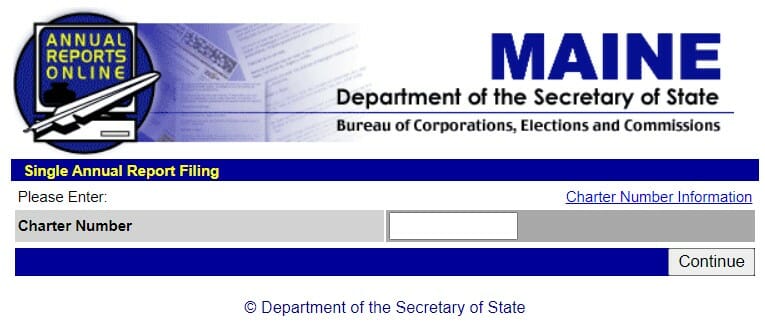
Alternatively, you can create a preprinted annual report form and file by mail.
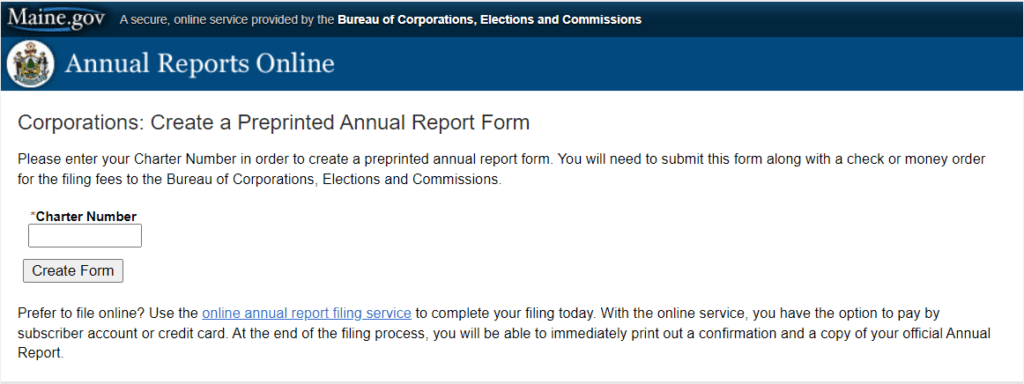
Mail your completed annual report form and a check for the filing fee to:
Maine Secretary of State
Division of Corporations, UCC and Commissions
101 State House Station
Augusta, ME 04333-0101
In Maine, annual reports are due by June 1st each year. The penalty for filing late is $50, while the penalty for failing to register a report altogether could result in the dissolution of your LLC.
In Maryland, the annual report is filed with the State Department of Assessments and Taxation. You can file online by visiting the Business Express webpage and taking the following steps. Note that if you don’t already have a Business Express account, you’ll need to create one to file online.
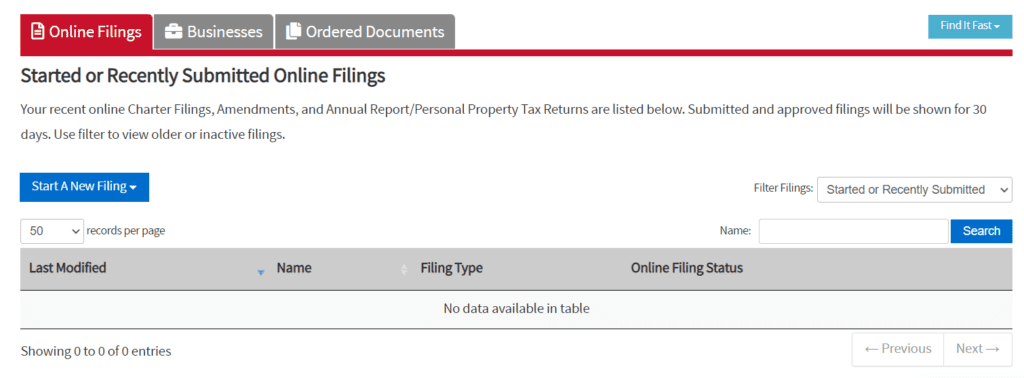

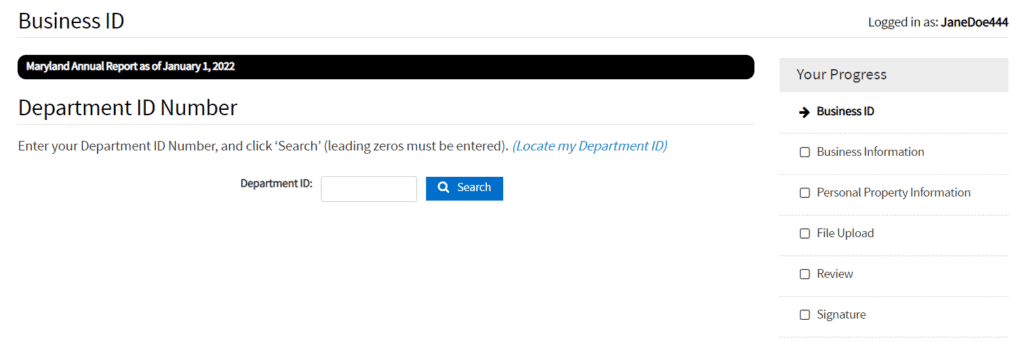
Alternatively, you can download and complete a paper form.
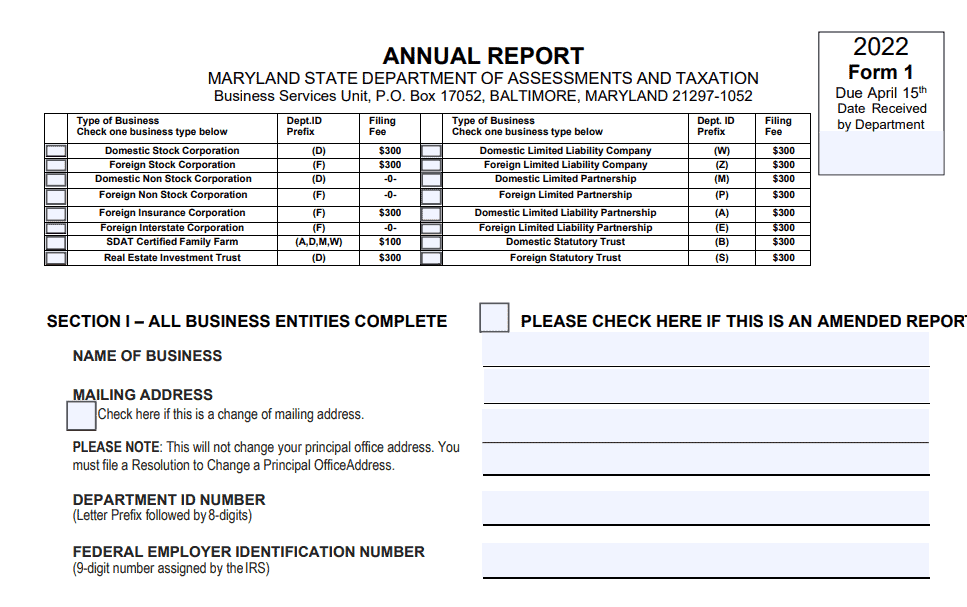
Mail your completed documentation and a check for your $300 filing fee to:
Maryland State Department of Assessments and Taxation
Business Services Unit
P.O. Box 17052
Baltimore, Maryland 21297-1052
In Maryland, annual reports are due by April 15th each year. The penalty for filing late depends on how many days it is past due. The base late fee is $30 with a maximum of $500.

The penalty for failing to register a report altogether is potential dissolution of your LLC. To request a 60-day extension, complete an application with the State Department of Assessments and Taxation.
In Massachusetts, the annual report is filed with the Secretary of the Commonwealth. You can file online by visiting the state’s online filing system and taking the following steps.
To file by mail, fill out Massachusetts’ LLC Annual Report form and send it to the address below.
State of Massachusetts Secretary of the Commonwealth
Corporations Division
McCormack Building
One Ashburton Place, 17th floor
Boston, MA 02108
Phone: 617.727.9640
In Massachusetts, annual reports are due every year on or before the date you initially filed your LLC’s certificate of organization. There are no penalties for LLCs that file an annual report late, but the penalty for failing to file a report altogether is administrative dissolution after two years.
In Michigan, the annual statement is filed with the Department of Licensing and Regulatory Affairs. You can file online by visiting the corporations online filing system and taking the following steps.
To file by mail, you can fill out your form on the same system, print it, and mail it, along with the $75 fee, to:
Ottawa Building
611 W. Ottawa
P.O. Box 30004
Lansing, MI 48909
Phone: 517-241-9223
In Michigan, annual statements are due every year on February 15th. The penalty for filing late is $50. Failure to file the annual statement will result in your company no longer being in good standing after two years and your business name becoming available.
In Minnesota, the annual renewal is filed with the Secretary of State. You can file online by visiting the online business services website and taking the following steps.
If you choose to file by mail, download the form and mail it to:
Minnesota Secretary of State – Business Services
First National Bank Building
332 Minnesota Street, Suite N201
Saint Paul, MN 55101
Phone: 651-296-2803
In Minnesota, annual renewals are due every year by December 31st. The penalty for filing late is $0, while the penalty for failing to register a report altogether is the dissolution of the LLC.
In Mississippi, the annual report is filed with the Secretary of State. You can file online by visiting the business services website and taking the following steps.
To file by mail, you can print the form from your account and mail it to:
P.O. Box 136
Jackson, MS 39205-0136
Phone: 601-359-1633
In Mississippi, annual reports are due every year by April 15th. The penalty for filing late is $0, while the penalty for failing to register a report altogether is the dissolution of the LLC.
In Montana, the annual report is filed with the Secretary of State. You can file online by visiting the secretary of state’s business services website and taking the following steps.
You cannot file your annual report by mail. You can only file online.
If you have questions, call 406-444-3665.
In Montana, annual reports are due every year by April 15th. The penalty for filing late is $15, while the penalty for failing to register a report altogether is the dissolution of the LLC.
In Nebraska, the biennial report is filed with the Secretary of State. You can file online by visiting the secretary of state’s business services website and taking the following steps.
To file by mail, you’ll fill out the form on the same system, but print it instead of file it and mail it, along with the $10 fee, to:
Nebraska Secretary of State
1201 N Street, Suite 120
P.O. Box 94608
Lincoln, NE 68508
[email protected]
402.471.2554 Phone
402.471.3237 Fax
In Nebraska, biennial reports are due every odd year by April 1st. The penalty for filing late is $0, while the penalty for failing to register a report altogether is the dissolution of the LLC.
In Nevada, the annual list is filed with the Secretary of State. You can file online by visiting the Silver Flume website and taking the following steps.
If you choose to file by mail, you can download the form and mail it, along with the $150 fee, to:
Secretary of State
202 North Carson Street
Carson City, Nevada 89701-4201
Phone: (775) 684-5708
In Nevada, annual lists are due every year by the end of the anniversary month of your LLC formation. The penalty for filing late is $75, while the penalty for failing to register a report altogether is the dissolution of the LLC.
In New Hampshire, the annual report is filed with the Secretary of State. You can file online by visiting the Secretary of State website and taking the following steps.
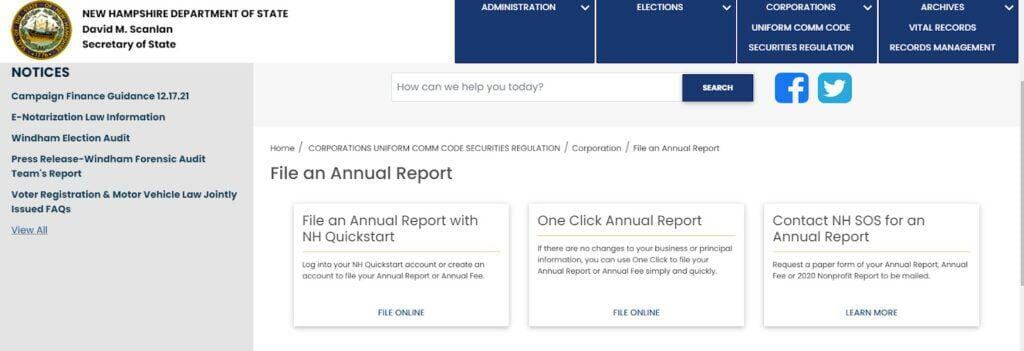
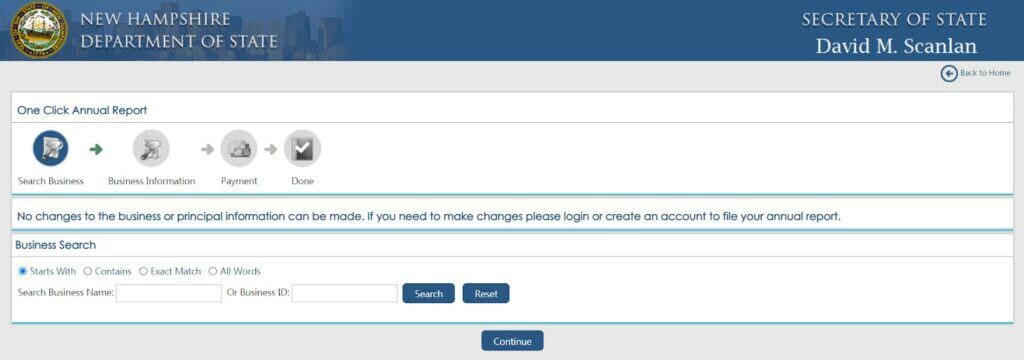
Alternatively, you can request a paper form by sending an email to [email protected] or calling 603-271-8200.
Mail your completed form, $100 fee, and documentation to:
Corporation Division
NH Department of State
107 N. Main St.
Concord, NH 03301-4989
In New Hampshire, annual reports are due by April 1st each year. The penalty for filing late is $50, while the penalty for failing to register a report altogether is potential dissolution of your LLC.
In New Jersey, the annual report is filed with the Department of the Treasury Division of Revenue and Enterprise Services. You can file online by visiting the Annual Reports and Change Services website and taking the following steps. There is no mail-in option in New Jersey.
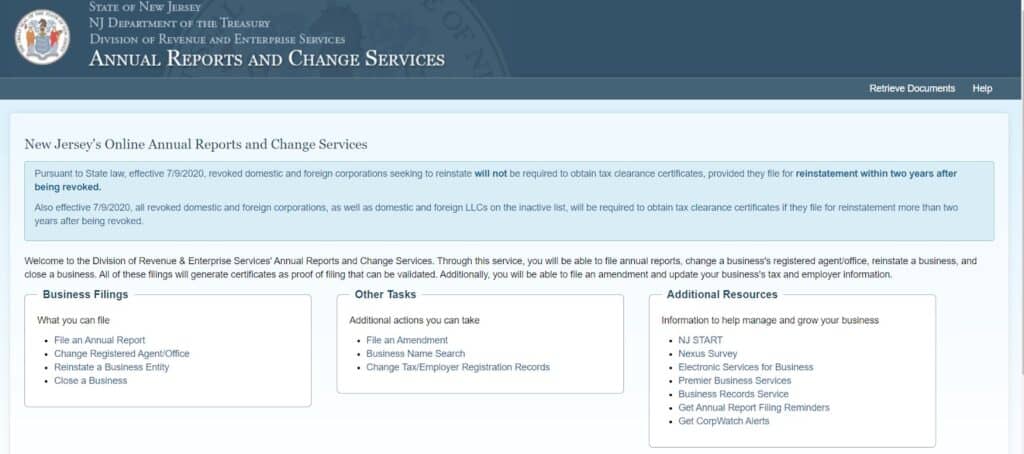
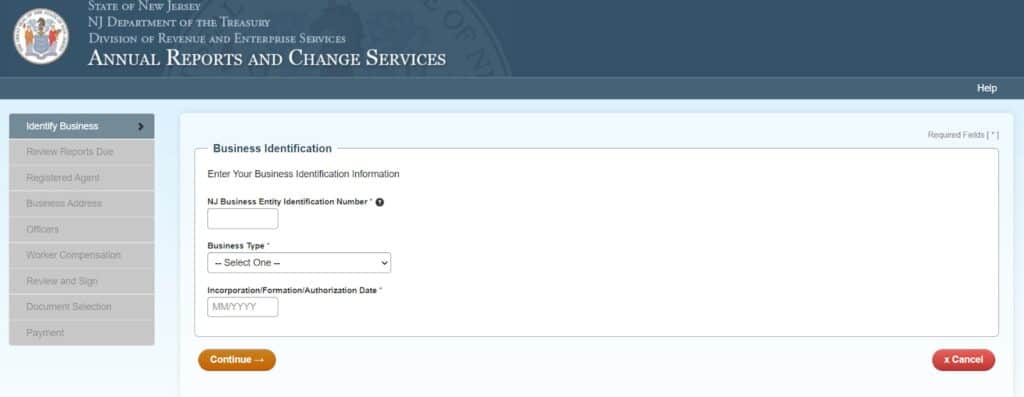
In New Jersey, annual reports are due every year at the end of the month in which you incorporated your LLC. For example, if your business anniversary is on May 15th, your annual report will be due each year by May 31st.
There are no late fees associated with failing to file your annual report on time. However, failure to file altogether could result in the state revoking your good standing status and dissolving your business. Failure to file two consecutive years in a row will require you to pay all outstanding filing fees plus a $75 reinstatement fee.
In New York, the biennial statement is filed with the Department of State. You can file your statement online by using the Department of State’s online filing system when the service is available:
Hours: Monday through Friday from 6:00 AM – 7:30 PM
When you’re ready to file, visit New York’s e-Statement Filing System and take the following steps.

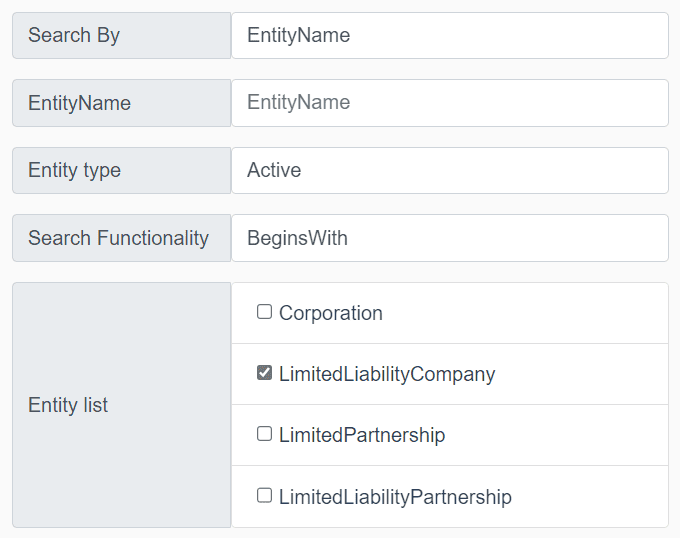

New York State does not currently provide online access to biennial statements to print and mail, as you’ll see elaborated below.
In New York, biennial statements are due every two years and must be filed within the same calendar month that a business originally filed its articles of organization. An LLC that is late to file or fails to file a biennial statement altogether will have a statement status of past due and no longer be in good standing with the state. Additionally, failure to file a biennial statement may interfere with business transactions or even result in a business’s dissolution.
Late biennial statements can usually be filed online through New York’s Department of State. If you’re extremely late to file your business’s biennial statement, however, online filing might not be available. In this case, you must request a paper biennial statement form from the state.
All biennial statement requests must be submitted in writing and must explicitly identify your LLC’s name. Either your business’s DOS ID number or the date of its creation must also be included.
Use the contact information below to request a paper biennial statement form by mail, fax, or email.
New York State Department of State
Division of Corporations, Statement Unit
One Commerce Plaza, 99 Washington Avenue
Albany, NY 12231
Phone: 518.473.2492
Fax: 518.486.4680
Email: [email protected]
In North Carolina, the annual report is filed with the Secretary of State. You can file online by visiting the Secretary of State’s Annual Report webpage and then taking the following steps.
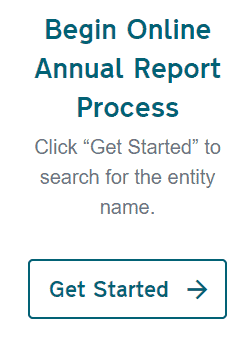
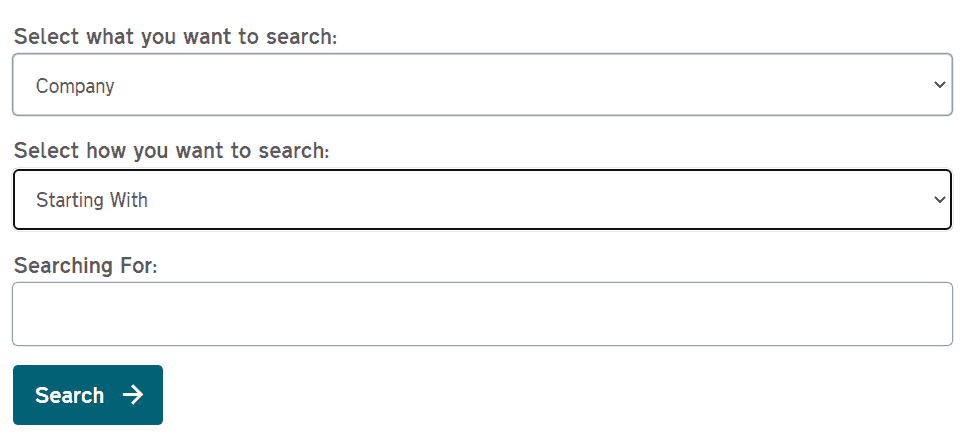
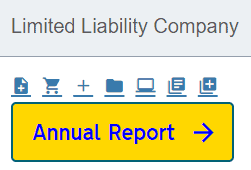

Filing an annual report is a little more complicated than filing one online. For guidance through the filing process, follow these steps:
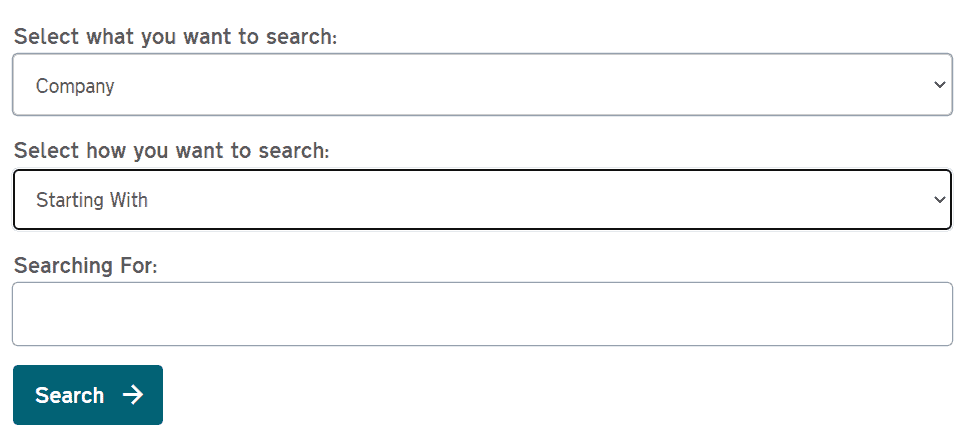



NOTE: Your form will be pre-populated with information from previous filings.
Mail your completed annual report and the filing fee of $200 to the state address listed below:
North Carolina Secretary of State
Business Registration Division
P.O. Box 29525
Raleigh, NC 27626
Phone: 919.814.5400
In North Carolina, business entities that file annual reports have different due dates according to their entity type. For LLCs, annual reports are due every year on April 15– excluding the year you started your business. For more information, you can review North Carolina’s chart of business entity annual report due dates.
LLCs that have not filed their annual report by the due date will receive the penalty of a Notice of Grounds from North Carolina’s Secretary of State. They will have 60 days from the notice’s date to file their annual report.
In North Dakota, the annual report is filed with the Secretary of State. You can file online by visiting the First Stop website and taking the following steps.
To file by mail, you’ll fill out the form the same way. Just click “print and mail” instead of file, and mail the form, along with the $50 fee, to:
Secretary of State
State of North Dakota
600 E Boulevard Avenue Dept 108
Bismarck ND 58505-0500
Telephone: 701-328-2900
In North Dakota, annual reports are due every year by November 15th. The penalty for filing late is $50, while the penalty for failing to register a report altogether is the termination of the LLC.
In Oklahoma, the annual certificate is filed with the Secretary of State. You can file online by visiting the secretary of state’s website and taking the following steps.
If you choose to file by mail, you can download the form and mail it, along with the $25 fee, to:
Oklahoma Secretary of State
421 N.W. 13th, Suite 210
Oklahoma City, OK 73103
Telephone: (405) 522-2520
In Oklahoma, annual certificates are due every year on the date you started your business. The penalty for filing late is $0, while the penalty for failing to register a report altogether is the dissolution of the LLC.
In Oregon, the annual report is filed with the Secretary of State, and filing is only available online. You can file by visiting Oregon’s Business Registry page and taking the following steps.
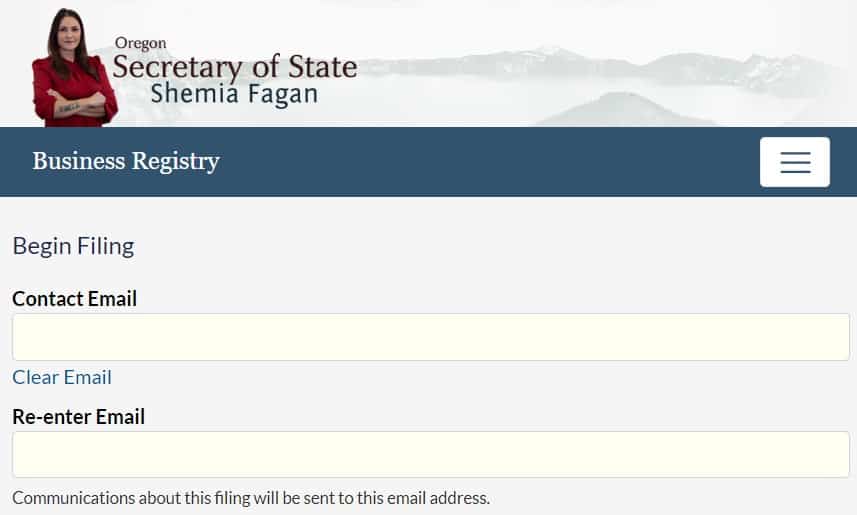


In Oregon, annual reports are due every year on the date you started your business. The penalty for filing late occurs after 45 days and results in your business being labeled “inactive” and liable to be dissolved. If you fail to file an annual report altogether, your business will be administratively dissolved within five years.
In Pennsylvania, the decennial report is filed with the Department of State’s Bureau of Corporations and Charitable Organizations. The state requires all decennial reports to be filed by mail, so these reports cannot be completed online or submitted via email.
Remember, your LLC only needs to file a decennial report with Pennsylvania if your business has not had any new or amended filings processed with Pennsylvania’s Bureau of Corporations and Charitable Organizations in the last ten-year stretch. Be sure to review your LLC’s filings within the relevant period to determine if your business needs to file a decennial report.
You can file by visiting Pennsylvania’s Department of State webpage and then taking the following steps.





Pennsylvania Department of State
Bureau of Corporations and Charitable Organizations
P.O. Box 8722
Harrisburg, PA 17105
In Pennsylvania, decennial reports are due every ten years when the year ends with the number one – such as 2011, 2021, and 2031. Decennial reports can be filed at any time during the corresponding year.
Businesses in Pennsylvania that file their report late or even fail to file a decennial report altogether face the same penalties and risks. Pennsylvania won’t fine or formally close your LLC, but your business’s exclusive rights to its name will be suspended. This means another company could register itself under your LLC’s name, even though your business would still exist.
When a business does file a late decennial report, it will regain exclusivity of its registered name– as long as a different business did not claim the name during the associated suspension period.
In Rhode Island, the annual report is filed with the Secretary of State. You can file online by visiting the business services online website and taking the following steps.
If you choose to file by mail, you can download the form and mail it, along with the $50 fee, to:
Division of Business Services
148 W. River Street
Providence, Rhode Island 02904-2615
Phone: (401) 222-3040
In Rhode Island, annual reports are due every year by May 1st. The penalty for filing late is $25, while the penalty for failing to register a report altogether is the dissolution of the LLC.
In South Carolina, the annual report is filed with the Department of Revenue along with your state corporate tax return. The annual report is schedule D of the tax return form. To file online, you must use one of the following approved tax software options:
You must file and pay online using one of these services if you owe more than $15,000 in taxes.
If you are eligible and want to file by mail, you can download the form and mail it, along with your payment, as follows:
Mail Balance Due returns to:
SCDOR Corporate Taxable
PO Box 100151
Columbia, SC 29202
Mail Refund or Zero Tax returns to:
SCDOR Corporate Refund
PO Box 125
Columbia, SC 29214-0032
If you have filing questions, call 803-734-2158.
In South Carolina, corporate tax returns and annual reports are due on or before the 15th day of the fourth month after the close of the taxable year. If you file the return late, you will receive a penalty of 5% per month, not to exceed 25%.
In South Dakota, the annual report is filed with the Secretary of State. You can file online by visiting the Secretary of State website and taking the following steps.
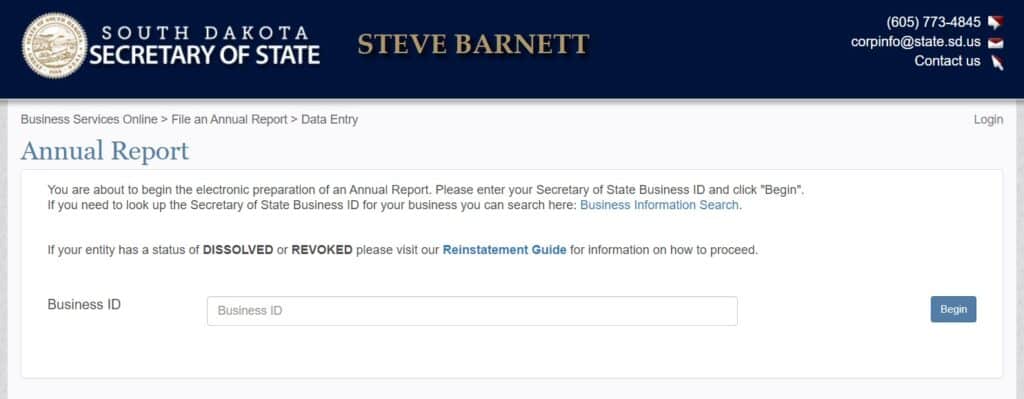
Alternatively, you can complete a paper form and file your annual report by mail. Note that the fee for paper filings is $65.
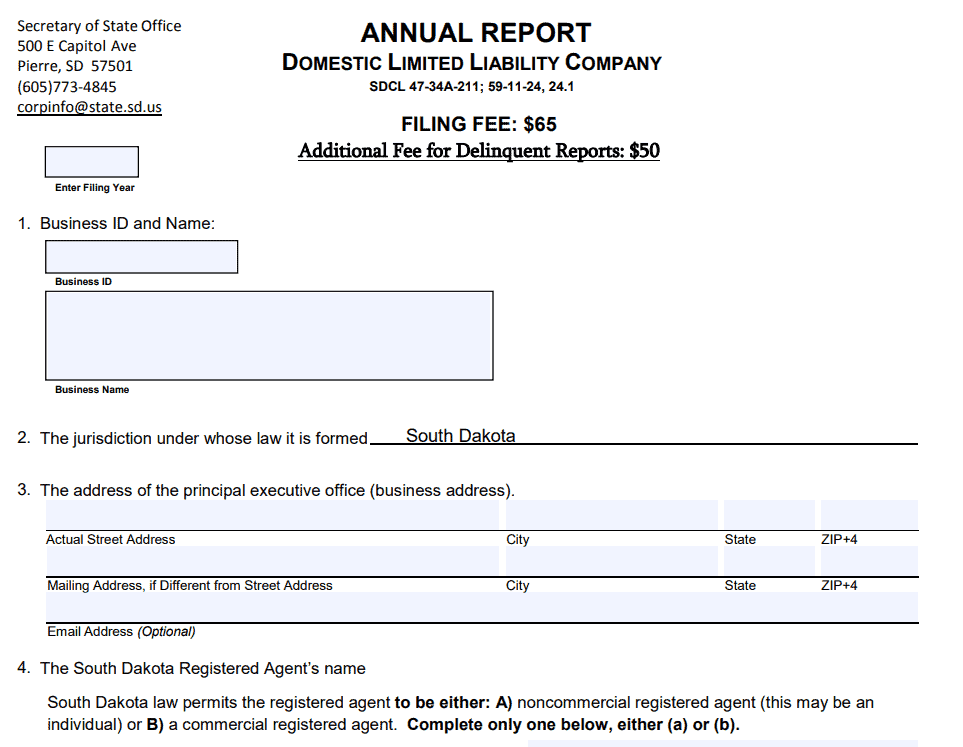
Send your completed form and fee to:
South Dakota Secretary of State Office
500 E Capitol Ave
Pierre, SD 57501
In South Dakota, annual reports are due on the first day of the anniversary month in which you started your business. For example, if you started your business on May 15th, your annual report will be due each year on May 1st.
The penalty for filing late is $50. If you don’t file your annual report within three months of your anniversary date, your business will be designated as delinquent. Failure to file within one year will result in dissolution of your LLC.
In Tennessee, the annual report is filed with the Secretary of State. You can file online by visiting the Secretary of State website and taking the following steps.
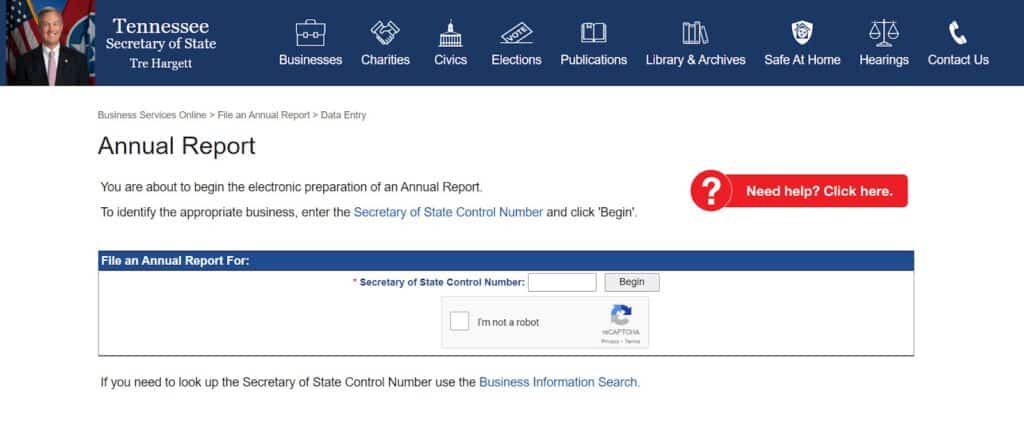
NOTE: In Tennessee, the annual report fee depends on the number of LLC members, or owners. There is a $300 minimum that, if you have more than six members, increases by $50 per member up to a maximum of $3,000.
Alternatively, you can submit your annual report by mail. Send your completed documentation and appropriate fee to:
Tennessee Secretary of State
Attn: Annual Report
6th Floor – Snodgrass Tower
312 Rosa L. Parks Avenue
Nashville, TN 37243
In Tennessee, annual reports are due every year by the first day of the fourth month after the end of your LLC’s fiscal year. For example, if your fiscal year ends on December 31st, your annual report will be due on April 1st.
There is no monetary penalty for filing your annual report late. However, if you fail to file your annual report on time, you will lose your good standing status and risk the state dissolving your LLC.
In Texas, the annual report is filed with the Comptroller. Annual reports consist of two filings: your annual public information report and annual franchise tax report.
You can file online by visiting the Comptroller website and taking the following steps. If you don’t have an eSystems account, you’ll need to create one before filing online.
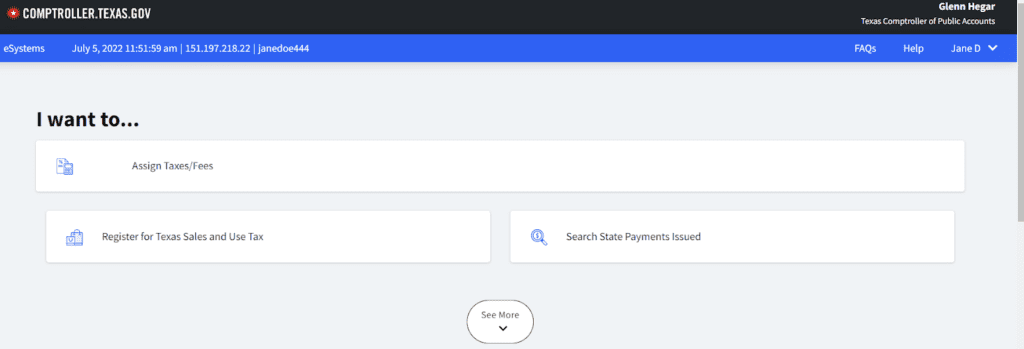

Alternatively, you can file by mail. Download the instructions and forms from the Comptroller website.
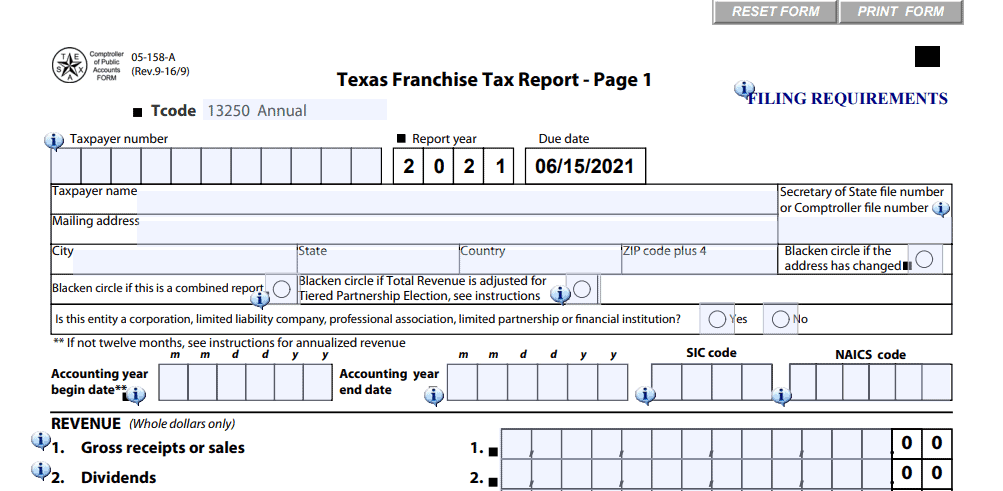
NOTE: If you do not owe franchise taxes, you still need to complete and file a No Tax Due Report.
Mail completed documentation and fees to:
Texas Comptroller of Public Accounts
P.O. Box 149348
Austin, TX 78714-9348
In Texas, annual reports are due every year on May 15th. The penalty for filing late is $50. Additionally, you will be charged a penalty of 5% of taxes due. If you do not file within 30 days of your due date, you will be charged an additional 5%. Late filings beyond 60 days will incur additional interest and risk administrative dissolution of the LLC.
In Utah, the annual report is filed with the Department of Commerce. You can file online by visiting the Division of Corporations and Commercial Code website and taking the following steps.

Alternatively, you can download a paper form and submit a hard copy of your annual report.
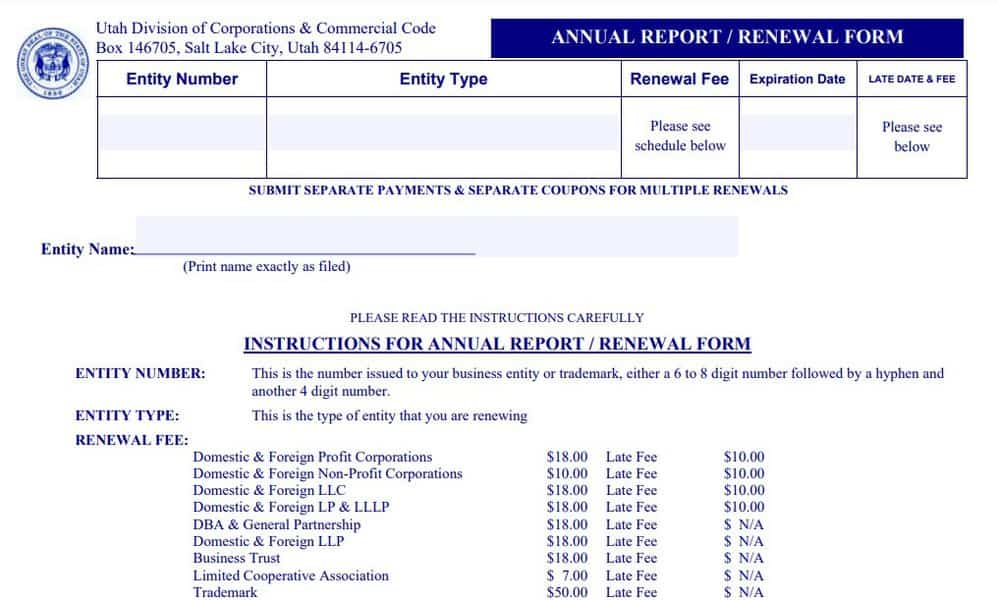
Submit your completed paperwork and a check for your filing fee to:
Utah Division of Corporations & Commercial Code
PO Box 146705
Salt Lake City, Utah 84114-6705
In Utah, annual reports are due every year on the date on which you started your business. The penalty for filing late is $10, while the penalty for failing to register a report altogether is the potential dissolution of your LLC.
In Vermont, the annual report is filed with the Secretary of State. You can file online by visiting the Secretary of State website and taking the following steps. If you don’t already have an online account, you’ll need to create one before filing your annual report online.
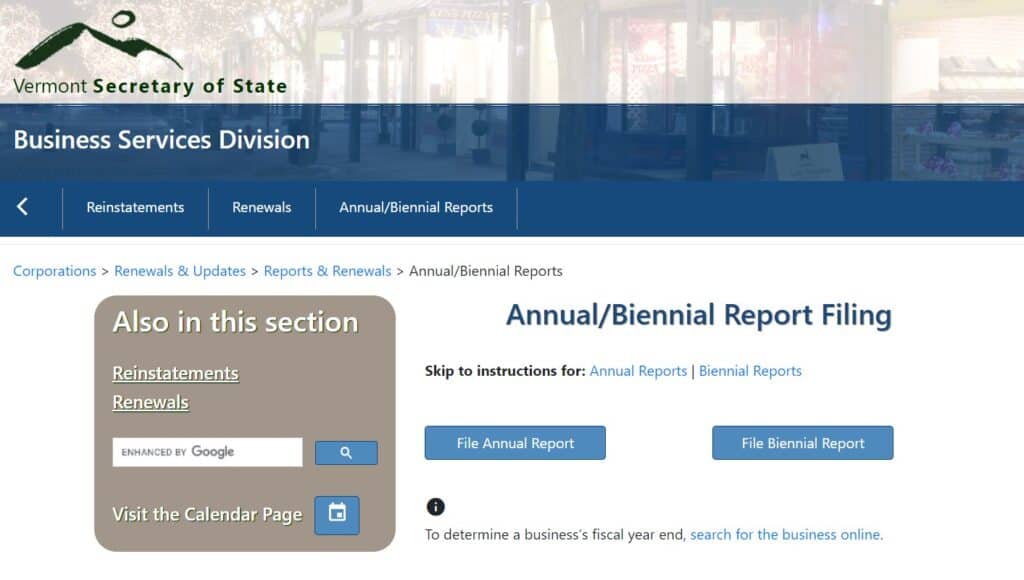
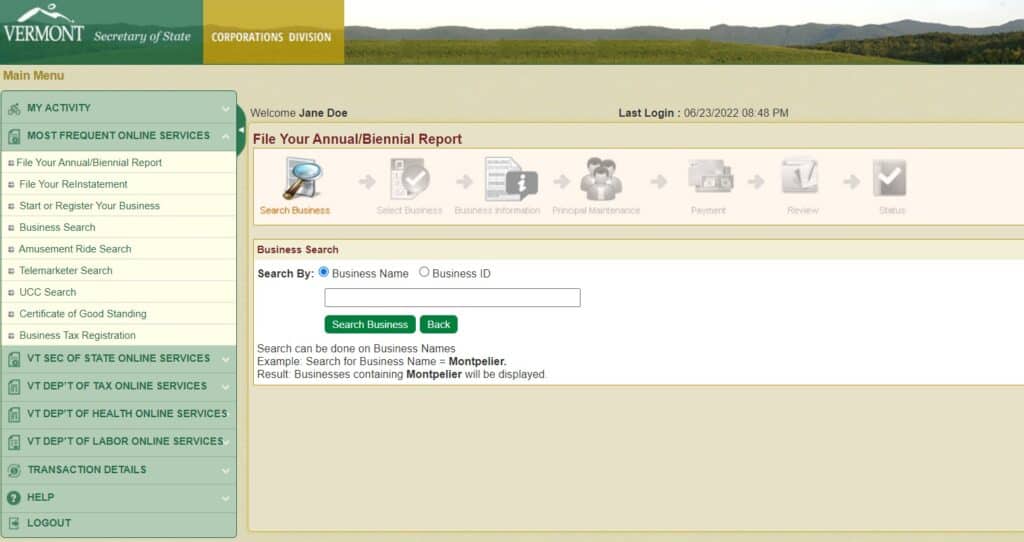
If you wish to file by mail, send a paper copy along with a check for your filing fee to:
Vermont Secretary of State
Corporations Division
128 State Street
Montpelier, VT 05633-1104
In Vermont, annual reports are due within three months after the end of your business fiscal year as determined when you filed your articles of organization. For example, if your fiscal year ends on December 31st, you’ll need to file your annual report between January 1st and March 31st.
If you fail to file within your three-month window, the state may move your business into a terminated status. Should this happen, you’ll need to pay a $25 reinstatement fee and catch up on all late filings.
In Virginia, the annual report is filed with the State Corporate Commission. You can file online by visiting the Clerk’s Information System (CIS) website and taking the following steps. NOTE: If you don’t already have a CIS account, you will need to create one to file your annual report online.
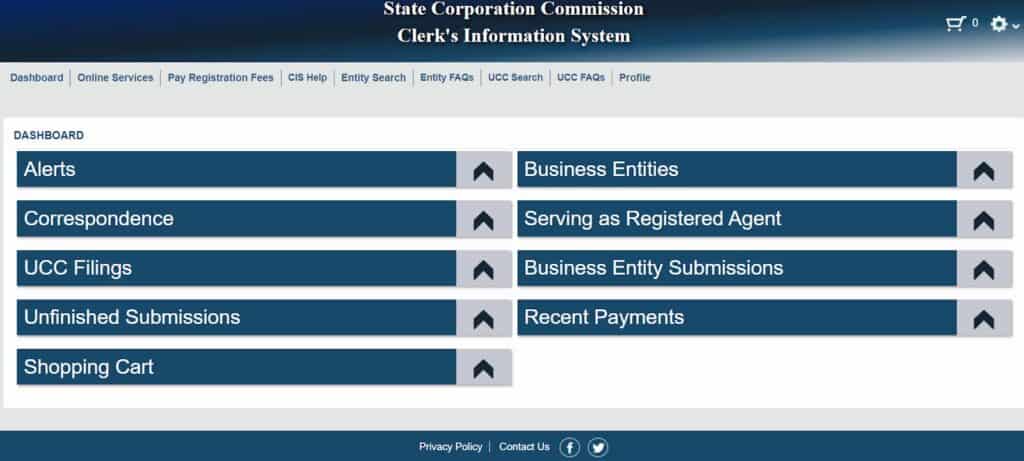


If you prefer to file your annual report by mail, request a paper form through the State Corporate Commission website and mail a copy to:
Virginia State Corporation Commission
P.O. Box 1197
Richmond, VA 23218
In Virginia, annual reports and registration fees are due every year on the last business day of the month in which you started your business. For example, if your business anniversary is May 15th, your annual report will be due each year on May 31st.
The penalty for filing late is $25. If you fail to file your annual report by the fourth month following your due date, the state of Virginia will revoke your privilege to do business in the state.
In Washington, the annual report is filed with the Secretary of State’s Corporations and Charities Division. You can file online by visiting the CCFS portal and taking the following steps.
Alternatively, you can file an express report without logging in. Click on the Express Annual Report Link on the homepage.
If you wish to file by mail, print the PDF of your completed report and mail it along with a check for your filing fee to the address below. Make your check out to the Secretary of State.
Washington Secretary of State
Corporations and Charities Division
PO Box 40234
Olympia, WA 98504-0234
In Washington, annual reports are due every year on the last day of the month in which you started your business. For example, if your business anniversary is May 15th, your annual report will be due each year on May 31st.
The penalty for filing late is $25. If you fail to register a report altogether, you will receive a notice from the state with their intent to revoke your business’s status as a legal entity. This happens approximately 120 days from a past filing deadline.
In West Virginia, the annual report is filed with the Secretary of State. You can file online by visiting the WV One Stop Business Portal and taking the following steps.


In West Virginia, annual reports must be filed and paid by July 1st each year, starting the first year after your business was registered. The penalty for filing late is $50, while the penalty for failing to register a report altogether is a potential revoking of your business privileges in West Virginia.
In Wisconsin, the annual report is filed with the Department of Financial Institutions. You can file online by visiting the One Stop Business Portal page and taking the following steps.
In Wisconsin, annual reports are due every year by the end of the quarter in which you started your business. The quarterly due dates are March 31, June 30, September 30, and December 31.
If you do not file your annual report on time, you don’t need to pay a fee, but you are jeopardizing your business status. Businesses can be administratively dissolved if filings are not filed within one year of their due date.
In Wyoming, the annual report is filed with the Secretary of State. You can file online by visiting the Wyoming Business Center through the Secretary of State website and taking the following steps.
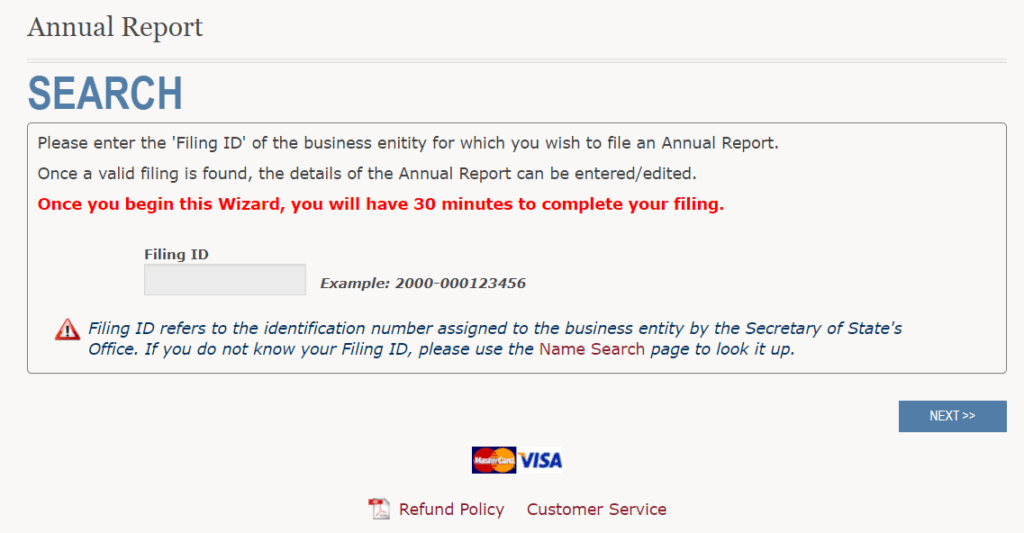
Wyoming Secretary of State
Herschler Building East
122 W 25th Street, Suite 101
Cheyenne, WY 82002-0020
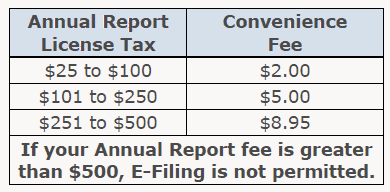
In Wyoming, annual reports are due on the first day of the month in which you initially formed your company. For example, if your business officially began on April 25th of this year, your first annual filing will be due on April 1st of next year.
There are no fees associated with late filings, but your business will be considered delinquent on the second day of the month following its due date. If you do not file your annual report within 60 days of the due date, the business entity will be administratively dissolved.
You can generally complete the annual report form online, though every state’s annual report form is different. Sometimes minimal information is required, while other states require more details, including member information.
Again, state annual report fees vary and range from free to an $800 annual tax in California. You can usually pay the annual fee online by credit card and file the report electronically.
If you’re doing business in other states, you must be registered as a foreign LLC in those states and follow their reporting requirements as well.
After you file your report, you will receive a notification of any errors or omissions, or confirmation that your report has been filed. If you receive a notification, it’s crucial that you respond quickly and address any errors in order to avoid penalties.
Most states require an annual report, but it may be called something else in your state, such as an annual certificate, a biennial report, a periodic report, or a franchise tax report. Some states require that you also file a statement of information, which is just a form that lets the state know you’re still doing business. Fees and requirements vary by state. If you fail to follow your state’s rules regarding annual filings, your LLC may be dissolved by the state, so check with your secretary of state for requirements.
If you don’t file an annual report, you may incur additional fees and penalties, and your LLC could even be administratively dissolved.

Published on August 22, 2022
If you’re starting an LLC, the business entity formation process is one of the first and most important hurdles. This step can be terribly complex ...
Read Now

Published on December 30, 2021
If you’re starting a business, you may be considering forming a limited liability company (LLC) and have heard that you need to file articles ofor ...
Read Now

Published on July 20, 2021
Do some digging into the owners of industry and you will find the vast majority do not live in the state where they own theirbusinesses. ItR ...
Read Now
No thanks, I don't want to stay up to date on industry trends and news.
Comments